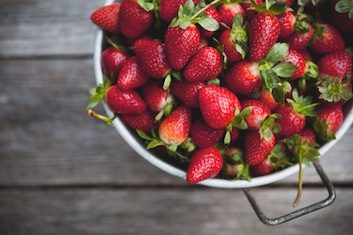New reasons to love strawberry season
Nothing beats the aroma of freshly picked strawberries. And it’s no wonder they smell so divine: Did you know the strawberry plant is a member of the rose family? Here are more reasons to love them

Source: Best Health magazine, Summer 2014
Let us count the ways strawberries are good for you: They are full of fibre, and one cup (250 mL) contains an entire day’s worth of vitamin C, which helps strengthen the immune system and protects connective tissue. Berries may help keep blood sugar in check; they contain red-blue natural plant compounds called anthocyanins that may help lower blood sugar.
Protect your heart
Those amazing anthocyanins also help to protect your heart: Eating three or more servings of strawberries and blueberries a week may help slash heart attack risk by as much as one third, according to a study of more than 93,000 women ages 25 to 42. The study, published last year in the American Heart Association’s journal Circulation, suggested that the anthocyanins in both types of berries may help dilate arteries and reduce plaque buildup.
Reduce cholesterol
What’s more, a team of researchers in Italy and Spain asked 23 healthy volunteers to add 500 grams of strawberries to their diet every day for over a month. The results, published in March in the Journal of Nutritional Biochemistry, show a significant reduction in the levels of triglycerides and ‘bad’ cholesterol. Wow!
Boost memory
But we’re not done yet. According to a study of older women published in the Annals of Neurology, eating berries such as strawberries at least twice a week delayed their cognitive and memory decline by up to 2½ years. And fisetin, a flavonol found in strawberries, appears to protect mice against memory loss caused by Alzheimer’s disease, says a study published in April in the journal Aging Cell.
So buy lots of them, now. Don’t stop at making jam; freeze in-season strawberries to get their benefits all year. Here’s how: Wash hulled berries in cold water and let dry completely on paper towels or in a colander. Spread dry berries on wax or parchment paper on a baking sheet (don’t let them touch each other), and place in the freezer. Once they are completely frozen, pack them in a tightly sealed container and immediately put them back in the freezer.
Tip Buy organic, if you can: Strawberries are second only to apples as the most pesticide-contaminated produce, according to the Environmental Working Group’s ‘Dirty Dozen‘ list. And, it’s rare, but’There have been cases of E. coli traced to strawberries. To avoid any problems, make sure that you thoroughly wash and hull strawberries before using.
This article was originally titled "Juicy Fruit" in the Summer 2014 issue of Best Health. Subscribe today to get the full Best Health experience’and never miss an issue!




